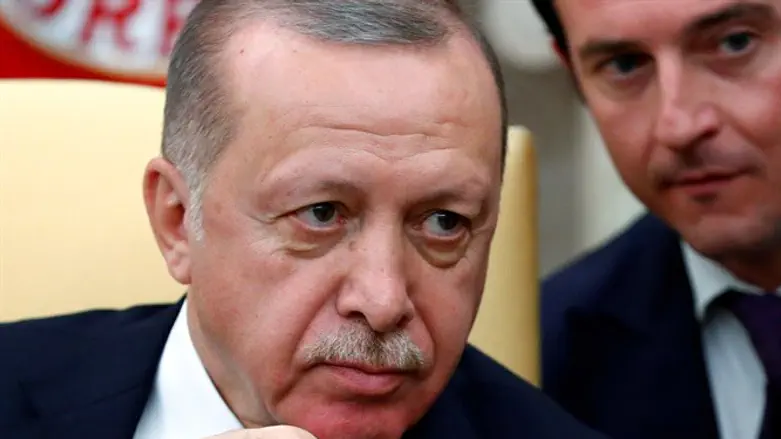
Tulsi Gabbard, one the Democratic Party’s hopefuls in the race for the Presidency of the United States called him “one of the most dangerous dictators in the world”.
Gabbard was talking about Turkey’s autocratic leader Recep Tayyip Erdogan who’s just declared war on the regime of Syrian tyrant Bashar al-Assad after the latter’s forces killed 34 Turkish soldiers in the northern Syrian Province Idlib.
US President Donald J. Trump “needs to make it clear to NATO and Erdogan that the United States will not be dragged into a war with Russia by the aggressive, Islamist, expansionist dictator of Turkey, a so-called “NATO” ally,” Gabbard wrote on her Twitter account.
The 33 Turkish soldiers who died as a result of an airstrike by Assad’s air force caused Erdogan to lose his cool once again and prompted operation “Spring Shield” after the Turkish army had already lost 55 soldiers to fighting in Syria since the beginning of February.
The new Turkish offensive in Syria and the aggressive moves by the pro-Assad coalition which is trying to re-conquer the last major rebel hub in Idlib have created an unprecedented humanitarian disaster even by Syrian standards.
The violence has driven more than one million Syrians from their homes while hundreds, including many children and women, died in February.
The Syrian Observatory for Human Rights reported that 1,773 individuals were killed in February across the war-torn nation; most of them in the Idlib province. It was the highest single month death toll over the last 23 months of fighting.
The pro-Assad coalition also ‘took out’ 73 hospitals in Idlib by bombing them to smithereens in an old tactic to deprive the mostly Islamist rebels of medical assistance in case they got wounded.
Turkey first tried to stop the advances of the pro-Assad coalition in Idlib by using its local Syrian allies – all of them Islamist rebel groups – but this didn’t have a major impact on the battlefield.
After the Turkish axis seemed to be on the brink of defeat, Erdogan realized he would have to come up with a more powerful military move without risking a major confrontation with Assad’s patron Russia.
The Turkish regime now says it “doesn’t want a face-off with Russia" and that "Our only aim is to stop the Syrian regime’s massacres, radicalization and, migration.”
During the new operation Erdogan’s air force claims to have attacked 200 Syrian targets while his ground forces reportedly “neutralized” 2,200 targets belonging to the pro-Assad coalition which is a predominantly Iranian-Shiite fighting force.
“Some 2,200 Syrian regime troops, a drone, 8 helicopters, 103 tanks, tens of howitzers, 3 air defense systems were neutralized during the operation Spring Shield,” Turkey’s Defense Minister Hulusi Akar said.
Among those ‘neutralized’ were at least “21 Iranian-affiliated terrorists” according to Turkish state-controlled media while 9 members of Lebanese Hezbollah were also killed.
On Monday afternoon, Turkey’s military downed two Syrian warplanes over Idlib after Syria’s official news agency SANA reported that Assad’s forces had downed a number of Turkish drones.
Earlier, Erdogan demanded that NATO, of which Turkey is still a member despite closing military deals with Russia, interfere in the escalating conflict on behalf of his country.
“We call on NATO to (start) consultations. This is not (an attack) on Turkey only, it is an attack on the international community. A common reaction is needed. The attack was also against NATO,” one of Erdogan’s spokesmen told media outlets.
After this call upon NATO apparently fell on deaf ears, the Turkish regime demanded that Russia "get out of Turkey’s way” and leave it "face to face" with the Assad regime.
When that didn’t help either, after the Kremlin pointed out to Turkey that Russian forces are there legally since Assad invited them, Erdogan reverted to other means of exerting pressure on Russia and arrested the editor-in-chief and two reporters of the Russian news site Sputnik.
The Russians subsequently responded by demanding that the detention of the three journalists be resolved “without further delay” and that Ankara safeguard the security of Russian journalists in the country.
The crisis between Russia and Turkey further exacerbated on Monday afternoon when the Turkish army shelled the headquarters of the Russian army command near the border town of Manbij which is controlled by the US-backed Syrian Democratic Forces.
Putin and Erdogan discussed the crisis over the telephone without reaching a solution. The two leaders are expected to meet in Moscow on March 5.
Turkey also upped the pressure on the European Union which Erdogan expects to choose sides with his country in the escalating conflict in Syria and finally made good on his threat to deport Syrian refugees to Europe.
According to the state-controlled Anadolu News Agency almost 81,000 of the 3.7 million Syrian refugees in Turkey “voluntarily” traveled to the borders with Greece and other European countries over the past few days.
Reporters belonging to non-Turkish media, however, reported that the refugees were being transferred to the border on government chartered buses.
Most of the refugees are stuck on the border with Greece that refuses to let them in and that shot with tear gas on those who nevertheless attempted to make the crossing.
Greece together with Cyprus has now requested an emergency meeting of the EU’s Foreign Affairs Council to discuss the refugee crisis.
To futher complicate matters, Iran is now reportedly also threatening Turkey and warned the Erdogan regime to leave Syria or have its troops face a missile barrage.
The Islamic Republic’s proxies are, in fact, the ones conducting the ground offensive against the Turkey-backed rebels in Idlib on behalf of Assad.